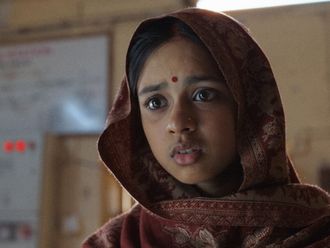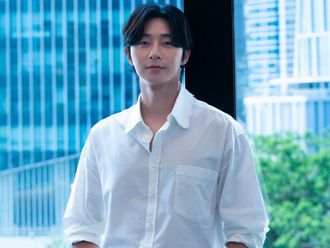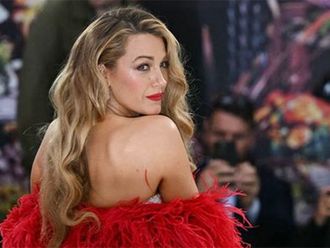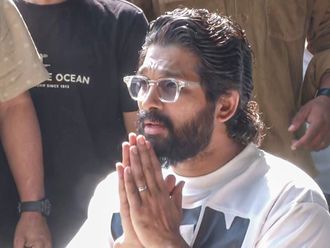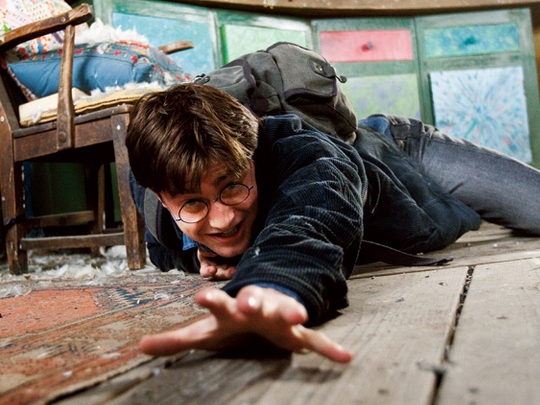
On a sticky June night just outside London, the magic finally came to an end for the cast and crew of the Harry Potter movies. After a decade together, the small army that has been the busiest in British filmmaking wrapped the final shoot of the last Potter production. The green-screen scene featuring the now world-famous main characters - a trio of young fugitive wizards named Harry, Ron and Hermione - required actors Daniel Radcliffe, Rupert Grint and Emma Watson to hurl themselves onto some off-camera mats to escape danger at the Ministry of Magic.
It was an oddly slapstick finish for such a monumental franchise - but that didn't sap the emotion of the moment. "I admit it, I did cry like a little girl," Radcliffe said, recalling the day. "There was a feeling that I had, that we all had, that it was the end of something very special." It's doubtful that pop culture will ever see a phenomenon quite like this sprawling tale that for a decade cast a spell on the page, the screen and beyond. The fantasy epic begins its Hollywood fade-out today with the release of Harry Potter and the Deathly Hallows - Part 1 and finishes next summer with the eighth film, Harry Potter and the Deathly Hallows - Part 2. Both movies are poised to be global blockbusters. The momentum for the movie's release has been building up rapidly. Over the last month fans have been treated to a series of clips and featurettes of the new movie.
In one of the clips, Radcliffe says, "The stakes are a lot higher in this film than they probably ever have been before. Harry suspects that any day now something's going to happen." In another clip, Ron asks Hermione, "[Harry] doesn't know what he's doing, does he?" Hermione replies, "None of us do.'
However, Watson is sure Potter fans will be thrilled. "The audience will be holding their breath like, ‘Ahh, are they going to make it? Oh, okay we can breathe again. It's going to be like that the whole way through."
Ray Subers of cinema tracking website www.boxofficemojo.com says the new movie will undoubtedly generate massive sales: "With over 57 per cent of polled Box Office Mojo readers voting it as their top choice to see this month, Harry Potter and the Deathly Hallows Part 1 rides a tidal wave of anticipation."
Why has Potter been so successful? Ultimately, says Lionel Wigram, now a producer at Warner Bros, Harry Potter is "the greatest wish fulfilment" story ever told. "The genius of Jo Rowling was she grounded the wish fulfilment of a real kid who has magical powers in the context of the real world so it was incredibly believable and you enter the fantasy with her," he says.
It may prove premature, though, to talk about Potter in the past tense. Appearing recently on Oprah Winfrey's show, Rowling, 45, sounded as if she were softening her stance that she had closed the book on the wizard epic. "I could definitely write an eighth, a ninth book," she mused. "I think I am done. But you never know."
Meanwhile, it's amazing how producer David Heyman and his team were able to keep their cast intact - including the young lead stars who started as adolescents and grew into young adults with millions in the bank, and no scandals. The movies arrived even as the audience for Rowling's books grew, creating a unique synergistic effect. The Potter movies have earned Warner Bros more than $1 billion in profit - and the admiration of industry rivals. "The books and movies fed each other brilliantly to become these commercial tidal waves," says veteran literary agent Ron Bernstein, of International Creative Management, who has no connection to the books or films. Former Walt Disney Studios Chairman Dick Cook, who launched his own mega-franchise with Pirates of the Caribbean, agrees that Harry Potter has been a breed apart. "It has unequivocally been the best-managed franchise that we've ever seen, top to bottom," he says. "The movies have been terrific and Warner Bros managed to position each one as a worldwide event. Each movie has been unique and built on the last one and the anticipation has never been better. They've honoured the source material and done everything right." And, unlike, say, The Lord of the Rings trilogy, the Potter movies adapted a living, breathing literary sensation whose ending was unknown. Rowling would visit the set and sometimes whisper to actors hints of their characters' destiny, but screenwriter Steve Kloves, who penned seven of the eight scripts, says no one really knew how everything would conclude.
There was intense debate about casting in the early days. Watson was an instant lock for the brainy Hermione, but filling the title role was more daunting. Heyman had met Radcliffe's parents at a play and encouraged them to bring their boy for an audition. Heyman championed the 10-year-old, but not everyone was convinced. Horn says there was a huge debate and another boy was "very, very close." Ultimately, it came down to four actors, including Tom Felton, who would end up portraying Potter's nemesis, Draco Malfoy. But after Rowling saw the Daniel Radcliffe screen test, she said, ‘That's how I always imagined Harry Potter.'
Bringing in billions
The numbers posted by the Potter films and products are extraordinary already. The six Warner Bros movies released to date have pulled in $5.7 billion at theatres worldwide; home video adds an additional $1.3 billion.
The seven novels from which they sprang, written by J.K. Rowling, account for 400 million books sold in 69 languages. Then there's a jaw-dropping $7 billion in retail products, a recently opened amusement attraction in Orlando, touring exhibits of props and costumes and plans for a permanent exhibit outside London.
Still, the true impact of the booksand films may not be fully recognisedfor a decade or two. With ever-rising ticket prices, box-office records don't stand for long, but no franchise has delivered anything close to eight films in ten years.



